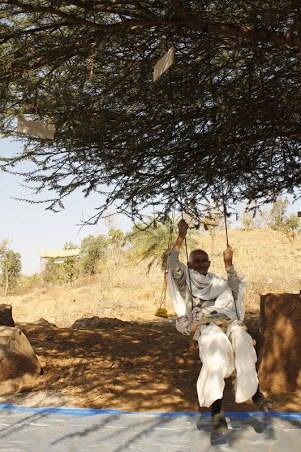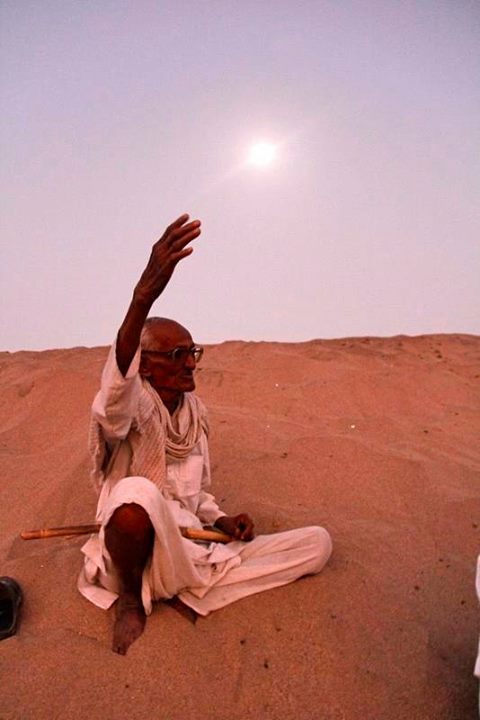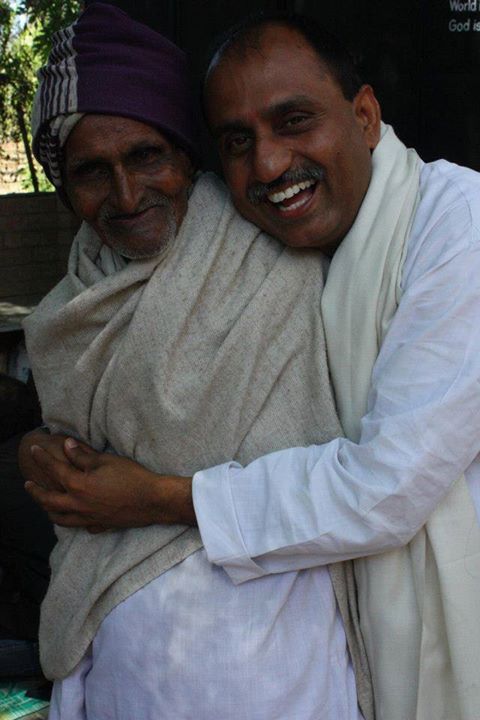 More than fifty years ago, Vinoba Bhave's Land-Gift movement happened to pass through the small town in North Gujarat. Several hundred people had gathered to hear the great Vinoba Bhave share his wisdom through stories from their movement that was sweeping the country in a wave of love. As people huddled into a small school class-room in the town of Unjha, Vinoba began to speak. It was then that he shared the concept of the 'Shanti Sena' - the 'Warriors of Peace'. At a time when the Cold War had just begun, Vinoba Bhave spoke of the need of holding peace within ourselves as a means to battle arms. He said - 'If every community had just 1 person who would dedicate his life to non-violence, we would see True Peace. Not a peace held in place by agreements and nuclear treaties, but one that honours the humanity within us all.'
More than fifty years ago, Vinoba Bhave's Land-Gift movement happened to pass through the small town in North Gujarat. Several hundred people had gathered to hear the great Vinoba Bhave share his wisdom through stories from their movement that was sweeping the country in a wave of love. As people huddled into a small school class-room in the town of Unjha, Vinoba began to speak. It was then that he shared the concept of the 'Shanti Sena' - the 'Warriors of Peace'. At a time when the Cold War had just begun, Vinoba Bhave spoke of the need of holding peace within ourselves as a means to battle arms. He said - 'If every community had just 1 person who would dedicate his life to non-violence, we would see True Peace. Not a peace held in place by agreements and nuclear treaties, but one that honours the humanity within us all.'
That one person in the community, dedicated to non-violence was known as a 'Shanti-Sainik'. If violence was to break out anywhere in the country, Shanti Sainiks would drop everything they held important and offer themselves non-violently to take on the Karma of the offenders. As Vinoba spoke, the excitement in the crowd became palpable. No one had ever heard of something as radical as this - it seemed like the only solution to true peace. Yet, who would be courageous enough to offer their lives to others in this way? Inspired by Vinoba, a young gentleman called Gopal chose to apply. As he wrote out the application form, he wondered what the use was, he was simply a Tea Merchant and there were several Doctors, Lawyers and Accountants who were so much more qualified in his community. Nevertheless, he sent in his application along with hundreds of others. Vinoba lifted the first paper out of the pile, and to his surprise, he said out aloud 'Who is this 'Gopal Das?' 'He will be the first Shanti Sainik of Unjha!'. Everyone turned around to see thin frame of Gopal Dada, but set deep within were eyes that shone with the resilience of a man who was about to embrace a huge responsibility.
In that very moment, Gopal knew his life's calling - to surrender himself in this army of love, and to serve his community. He subsequently walked with Vinoba Bhave across Gujarat for thousands of kilometres, and eventually settled in his village. Through a thousand songs that he had memorized to heart, Gopal Dada would work tirelessly with the children - inspiring them to serve their communities with honesty and a spirit of kindness.
Several decades ago, a young child ran up to Gopal Dada after a 'clean street competition' that had been organized. Disturbed by the ill-treatment towards the so called untouchables, the child was upset. Gopal Dada put his hand on the 12 year old's head and explained how a gradual degeneration in society had led to these inequalities. Looking into Gopal Dada's kind eyes, the young boy decided that his life must be dedicated towards the up-liftment of the most neglected castes. That child, was Ishwarbhai Patel, also known as a the father of sanitation in India - who's been credited with building close to half a million toilets in India over the last fifty years. That simple moment, nurtured by a loving smile, was all it took for a lifetime dedicated to service.
Such was the impact that Gopal Dada had on those around him. It seemed to flow effortlessly out of a natural state of existence. A few years ago, 15 of us were out on a walking pilgrimage by the Narmada. The intention was to walk collectively, and experience the generosity of villagers who would host us. During a particularly tough day on the pilgrimage when we walked 26 kilometres, Gopal Dada was paired with a girl called Maria from the USA. She noticed that the 87 year old man kept bending down as they walked, to pick up a stones and toss it to the side. It seemed odd, she thought - 'Why was he doing this?' She kept her questions to herself until she finally mustered up the courage to ask him why. 'Oh!', he replied, 'So that the people walking behind us and the cyclists who will pass this route will not be bothered by these rocks in their way'.
That's all it was. A way of life. To constantly think about the other in every moment, in every conversation. It was a way of service that did not even need a tangible connection with a supposed beneficiary. He didn't need to know how many cyclists he had saved, or even see their faces to serve them. It was a state of mind that was constantly looking to offer.
It was only fitting then, that a soul as pure as this, would return back to the Vinoba Ashram in Paunar to breathe his last. During the annual Gandhian gathering at the Ashram, his lungs developed pneumonia. He had close encounters with death before - but a life lived in the manual service of others had allowed him to return renewed - not to enjoy the fruits of his labour, but to keep serving in the spirit of Gandhi. But it seemed the night of November 17th had other plans. This time, to free him of the bondages of his body, so that he could serve in infinitely greater ways.
 Today, he may not be with us physically, but it seems like he's everywhere. As I write this blog, as I speak in a circle, as I wash someone else's dishes, or pick up a piece of trash on the road for a pedestrian I do not know. I can sense his constant presence in this flow of service. A flow that asks me to keep surrendering to what the collective needs
Today, he may not be with us physically, but it seems like he's everywhere. As I write this blog, as I speak in a circle, as I wash someone else's dishes, or pick up a piece of trash on the road for a pedestrian I do not know. I can sense his constant presence in this flow of service. A flow that asks me to keep surrendering to what the collective needs
My mind resounds with the questions that we would always ask of him 'Dada, is it okay if we walk another few more kilometres before resting?' 'Dada, we're off to a trip to a tribal community tomorrow - you must come with us!' 'Dada, can you sing us one of your songs?' The answer to all of these questions was always a nod and a gentle smile - as if to say 'I am but a pawn in this great army of love - tell me how I can offer more of myself!'
~ May his spirit continue inspiring us all. Jai Jagat ~
Here is a painting by Lahar, to honour the spirit of his service.
 More than fifty years ago, Vinoba Bhave's Land-Gift movement happened to pass through the small town in North Gujarat. Several hundred people had gathered to hear the great Vinoba Bhave share his wisdom through stories from their movement that was sweeping the country in a wave of love. As people huddled into a small school class-room in the town of Unjha, Vinoba began to speak. It was then that he shared the concept of the 'Shanti Sena' - the 'Warriors of Peace'. At a time when the Cold War had just begun, Vinoba Bhave spoke of the need of holding peace within ourselves as a means to battle arms. He said - 'If every community had just 1 person who would dedicate his life to non-violence, we would see True Peace. Not a peace held in place by agreements and nuclear treaties, but one that honours the humanity within us all.'
More than fifty years ago, Vinoba Bhave's Land-Gift movement happened to pass through the small town in North Gujarat. Several hundred people had gathered to hear the great Vinoba Bhave share his wisdom through stories from their movement that was sweeping the country in a wave of love. As people huddled into a small school class-room in the town of Unjha, Vinoba began to speak. It was then that he shared the concept of the 'Shanti Sena' - the 'Warriors of Peace'. At a time when the Cold War had just begun, Vinoba Bhave spoke of the need of holding peace within ourselves as a means to battle arms. He said - 'If every community had just 1 person who would dedicate his life to non-violence, we would see True Peace. Not a peace held in place by agreements and nuclear treaties, but one that honours the humanity within us all.' That one person in the community, dedicated to non-violence was known as a 'Shanti-Sainik'. If violence was to break out anywhere in the country, Shanti Sainiks would drop everything they held important and offer themselves non-violently to take on the Karma of the offenders. As Vinoba spoke, the excitement in the crowd became palpable. No one had ever heard of something as radical as this - it seemed like the only solution to true peace. Yet, who would be courageous enough to offer their lives to others in this way? Inspired by Vinoba, a young gentleman called Gopal chose to apply. As he wrote out the application form, he wondered what the use was, he was simply a Tea Merchant and there were several Doctors, Lawyers and Accountants who were so much more qualified in his community. Nevertheless, he sent in his application along with hundreds of others. Vinoba lifted the first paper out of the pile, and to his surprise, he said out aloud 'Who is this 'Gopal Das?' 'He will be the first Shanti Sainik of Unjha!'. Everyone turned around to see thin frame of Gopal Dada, but set deep within were eyes that shone with the resilience of a man who was about to embrace a huge responsibility.
In that very moment, Gopal knew his life's calling - to surrender himself in this army of love, and to serve his community. He subsequently walked with Vinoba Bhave across Gujarat for thousands of kilometres, and eventually settled in his village. Through a thousand songs that he had memorized to heart, Gopal Dada would work tirelessly with the children - inspiring them to serve their communities with honesty and a spirit of kindness.
Several decades ago, a young child ran up to Gopal Dada after a 'clean street competition' that had been organized. Disturbed by the ill-treatment towards the so called untouchables, the child was upset. Gopal Dada put his hand on the 12 year old's head and explained how a gradual degeneration in society had led to these inequalities. Looking into Gopal Dada's kind eyes, the young boy decided that his life must be dedicated towards the up-liftment of the most neglected castes. That child, was Ishwarbhai Patel, also known as a the father of sanitation in India - who's been credited with building close to half a million toilets in India over the last fifty years. That simple moment, nurtured by a loving smile, was all it took for a lifetime dedicated to service.
 |  |  |
That's all it was. A way of life. To constantly think about the other in every moment, in every conversation. It was a way of service that did not even need a tangible connection with a supposed beneficiary. He didn't need to know how many cyclists he had saved, or even see their faces to serve them. It was a state of mind that was constantly looking to offer.
It was only fitting then, that a soul as pure as this, would return back to the Vinoba Ashram in Paunar to breathe his last. During the annual Gandhian gathering at the Ashram, his lungs developed pneumonia. He had close encounters with death before - but a life lived in the manual service of others had allowed him to return renewed - not to enjoy the fruits of his labour, but to keep serving in the spirit of Gandhi. But it seemed the night of November 17th had other plans. This time, to free him of the bondages of his body, so that he could serve in infinitely greater ways.
 Today, he may not be with us physically, but it seems like he's everywhere. As I write this blog, as I speak in a circle, as I wash someone else's dishes, or pick up a piece of trash on the road for a pedestrian I do not know. I can sense his constant presence in this flow of service. A flow that asks me to keep surrendering to what the collective needs
Today, he may not be with us physically, but it seems like he's everywhere. As I write this blog, as I speak in a circle, as I wash someone else's dishes, or pick up a piece of trash on the road for a pedestrian I do not know. I can sense his constant presence in this flow of service. A flow that asks me to keep surrendering to what the collective needsMy mind resounds with the questions that we would always ask of him 'Dada, is it okay if we walk another few more kilometres before resting?' 'Dada, we're off to a trip to a tribal community tomorrow - you must come with us!' 'Dada, can you sing us one of your songs?' The answer to all of these questions was always a nod and a gentle smile - as if to say 'I am but a pawn in this great army of love - tell me how I can offer more of myself!'
~ May his spirit continue inspiring us all. Jai Jagat ~
Here is a painting by Lahar, to honour the spirit of his service.

No comments:
Post a Comment